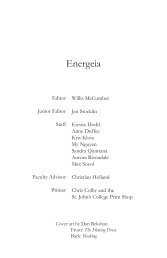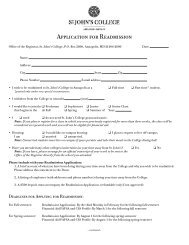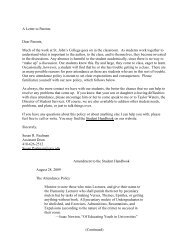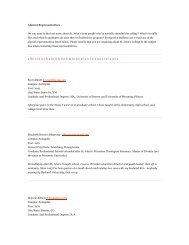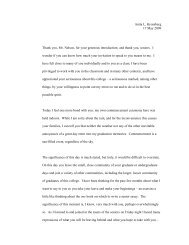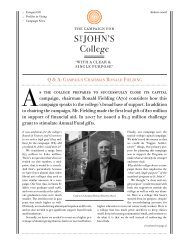âTo Meet with Macbeth,â given by tutor Louis ... - St. John's College
âTo Meet with Macbeth,â given by tutor Louis ... - St. John's College
âTo Meet with Macbeth,â given by tutor Louis ... - St. John's College
Create successful ePaper yourself
Turn your PDF publications into a flip-book with our unique Google optimized e-Paper software.
And damned be him that first cries, “Hold, enough!”<br />
(V.viii.28-34)<br />
Exit, fighting. Alarums. Enter fighting, and<br />
<strong>Macbeth</strong> slain. Retreat and flourish.<br />
<strong>Macbeth</strong> throws down his shield to act <strong>with</strong> all limbs on offense, no defense, his purpose not to die<br />
bravely, though he does die bravely, but to “try the last” singly. What is lasting in life? Not body, not<br />
family, not Malcolm’s line, for Banquo’s will take over, not Scotland, for England will take over. <strong>Macbeth</strong><br />
fights to see what--if anything--there is to see at the end. Is there anything to fear? Why keep a shield<br />
when the body is one <strong>with</strong> the mind and the mind does not yield?<br />
Part two of the fight now begins. This time Macduff must parry the fury of <strong>Macbeth</strong>’s assaults,<br />
as both men hear in the clash of swords the threat of damnation to the first who cries out for his life.<br />
They exit fighting, and for a short while the stage is bare and we hear only the “alarums” of war. What<br />
are we thinking as we wait for the action to resume onstage? Do we want to hear <strong>Macbeth</strong> cry “Hold,<br />
enough!”? Or are we like Lady <strong>Macbeth</strong> (at the beginning of II.ii), waiting for her man to return from the<br />
kill and afraid that something is going wrong offstage. When they re-enter still fighting, is it not terribly<br />
wonderful? <strong>Macbeth</strong> is not slain. Of course the tyrant must be slain: history requires it; the tragic form<br />
requires it; moral decency requires it. But is it not terrible to admit that we do not want <strong>Macbeth</strong> to cry<br />
“Hold, enough!” and be damned? We like seeing him this way, even at risk of his winning. But he<br />
cannot win. If <strong>Macbeth</strong> wins, life becomes as <strong>Macbeth</strong> describes in his “tomorrow” speech, meaningless<br />
and idiotic. Shakespeare has a good deal more to say about the meaning of life after this play.<br />
<strong>Macbeth</strong>’s are not the poet’s last words. 13<br />
Why is Macduff able to kill <strong>Macbeth</strong>? If we cannot answer this question, we have not<br />
understood the play. The two warriors, childless and wifeless, know the doom of flesh. Each has one<br />
cause left: <strong>Macbeth</strong> fights to live “the lease of nature” and not be damned <strong>by</strong> living cowardly (IV.i.99);<br />
13 Some people find that Prospero, who does have the last words, offers a gentle and comic version of <strong>Macbeth</strong>’s<br />
terrible nihilism.<br />
56




